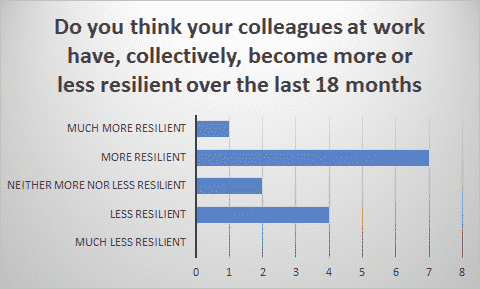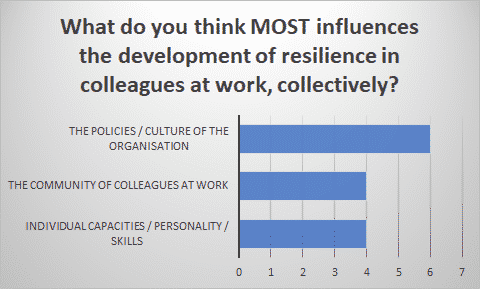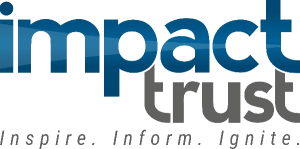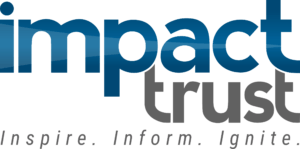
#BuildBackFuture-Fit: Resilience at Work
Future-Fit and the Impact Trust held the first “Resilience at Work” focus group conversations with Pioneer Companies last week. This collaborative effort seeks to explore how resilience is defined and operationalised in the context of people at work, collectively, and what intentional (formal) and spontaneous (accidental or informal) practices are understood to be supportive of resilience building amongst people at work, collectively.
Why now?
Transformation of the world of work, already well underway at the turn of the century, has been fast-tracked by a groundswell of social movements and the Covid pandemic over the past eighteen months. The impact of Covid on whether and how we work, has singularly and unilaterally placed in stark relief the need for organisations to prioritise workforce resilience as an essential component of organisational (and societal) sustainability. Flexibility, agility and persistence of people at work, collectively, and of workplaces themselves, have been unequivocally recognised as paramount for employee engagement, wellbeing and retention. Efforts to design and implement programmes that are supportive of building the capacities required for successfully navigating crisis and change are becoming a more important part of the human resource management agenda.
Yet a gap is evident in our understanding of what resilience means in this collective context, and what the end goal of resilience building strategies should be. This gap extends to our appreciation of the interaction and influence of individual (personal) and collective (societal) resilience behaviours on each other and on the ability of people and organisations to respond to change.
It is increasingly apparent is that organisations are realising that their resilience is interconnected with the resilience of their people, collectively. Being more intentional about the ways in which people at work experience and are able to reciprocate this, is increasingly essential, not only for individual wellbeing and engagement but for a deeper sense of organisational wellbeing and societal cohesion. Understanding more about the dialectical nature of this relationship, how policies, practices or strategies may impact, or cascade, between and beyond people at work, to strengthen or weaken the societal capacity for successfully navigating change (crises) in other areas of life, will help develop practical guidance as to how a work context might “Future-Fit” the collective resilience of organisations and their people.
What?
The Resilience at Work initiative seeks to explore how we can future-fit our people at work collectively. Understanding more about how resilience is defined and operationalised in the context of people at work, collectively, and what intentional (formal) and spontaneous (accidental or informal) practices are experienced or believed to be supportive of resilience building in this context forms part of the focus. Answering the questions: what makes for a dynamically resilient workforce (people at work, collectively) and might such collective resilience be a predictor of organisational stability and sustainability (whether surviving or thriving) are important ones to answer. Most crucially, updating the current guidance for Future-Fit companies and providing practical opportunities for enhancing these strategies in the world of work is the central goal.
We believe there are already many creative and practical strategies, policies and programmes in action that can help us, collectively, to thrive at work and beyond, in our lives and societies. Sadly, in many cases these are disparate and disconnected, and so not realising their full potential. Collaborating with others to understand, empirically, what works, when and where, and what doesn’t seem to, making practical guidelines visible, inclusive and systemic, is an important shared effort.
We would very much like your participation in this work.
We held the first collaborative “Resilience at Work” focus group conversations with the OMEGA Resilience Funders Network and with Future-Fit Foundation’s Pioneer Companies in June and July and were delighted to have such a diversity of participants from so many parts of the world (Australia, India, Singapore, Israel, Europe, the UK and North America.) adding an incredible richness to the discussion which was expertly facilitated by Barry Knight and Gerry Salole.
A “snap poll” of feelings about collective resilience over the last 18 months reflected that more than half of people are feeling more or much more resilient at work today than since the start of the pandemic. Most think a primary contributor has been the policies and culture of the organisation.
The Impact Trust’s Resilience at Work project, in collaboration with Future-Fit, OMEGA Resilience Funders Network, PSJP, the RSA’s Good Work Guild and others, is unfolding in three parts. The first part includes a deep dive into what we mean about resilience at work, collectively, and how we see it currently showing up. Phase 2 will seek to engage and survey widely to understand empirically the unique experiences of resilience at work, why it matters to them, where it is noticeable – in its presence or absence, and what the impact of it might be. Finally Phase 3 makes use of the methodology of a creative “design sprint” together with a Rawlsian thought experiment to understand more about “the world of work we want”, how it might overlap with “the world of work we need” and ideas about the way in which we get there. From these inputs we hope to consolidate findings to produce very practical guidance on the kind of strategies that can build collective resilience in the workplace environment and most importantly that reach the end goal, a flourishing life and good society.
We look forward to having you join us on this exploration. If you want further information, please do not hesitate to contact Tamzin Ractliffe at the Impact Trust or Alicia Ayars at Future-Fit.



